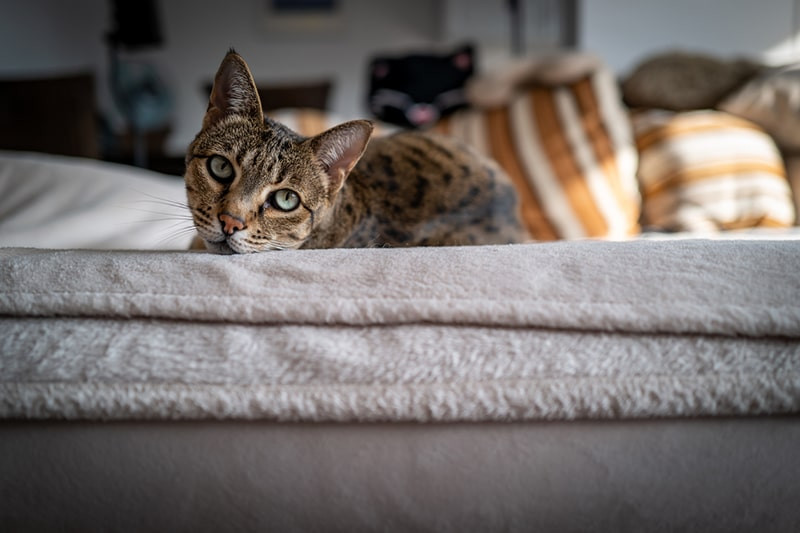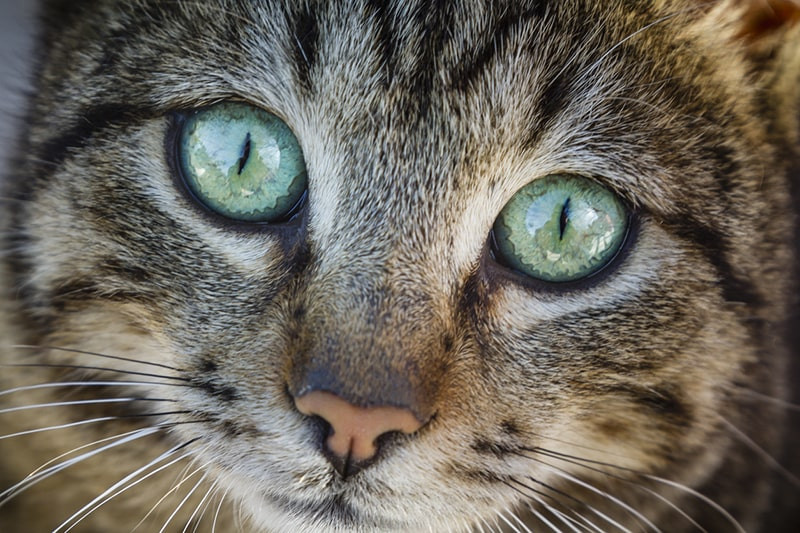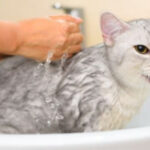Savannah cats, with their striking wild appearance and energetic personalities, have captured the hearts of feline enthusiasts worldwide. If you’re considering welcoming one of these magnificent creatures into your home, understanding their lifespan is a crucial part of responsible pet ownership. Just how long can you expect to enjoy the companionship of a Savannah cat? Let’s delve into the typical Savannah Cat Lifespan and the factors that influence their longevity.
Unveiling the Savannah Cat: A Breed Overview
Before we focus on lifespan, it’s essential to understand what makes Savannah cats unique. This relatively new breed emerged in 1986 as a hybrid of servals, wild African cats, and domestic breeds like Bengals, Egyptian Maus, and Oriental Shorthairs. This exotic ancestry gifts Savannahs with a distinctive appearance – tall and lean bodies, long necks, large ears, and a spotted coat reminiscent of their wild relatives. Often mistaken for miniature cheetahs, their striking looks are undeniable.
Coat colors range from black, brown, or black-spotted tabby, but the most common is a cream or sandy base with solid black or brown spots, varying in shape from round to oval. Beyond their looks, Savannahs are known for their sociable and people-oriented nature. They thrive on attention and interaction, making them ideal companions for families of all ages. However, their need for company means they are not suited to prolonged periods of solitude.
 savannah cat resting on a couch with a white blanket and striped pillows
savannah cat resting on a couch with a white blanket and striped pillows
Savannah Cat Lifespan: What to Expect
The average Savannah cat lifespan typically falls between 12 to 15 years. However, anecdotal evidence and experiences from Savannah cat owners suggest that many can live even longer, sometimes reaching 20 years or more. Like any cat breed, individual lifespan can vary significantly based on a multitude of factors, encompassing genetics, lifestyle, and overall care.
It’s important to remember that this is an average range. Some Savannah cats may unfortunately have shorter lifespans due to unforeseen health issues or accidents, while others, with optimal care and favorable genetics, will exceed the average and enjoy long, fulfilling lives.
Factors Influencing Savannah Cat Longevity
Several key elements play a crucial role in determining how long a Savannah cat will live. Understanding these factors empowers owners to provide the best possible care and potentially extend their feline companion’s lifespan.
Genetics and Breeding
Genetics are a foundational aspect of any animal’s lifespan. Responsible Savannah cat breeders prioritize health and genetic diversity, aiming to minimize the risk of hereditary conditions that could shorten a cat’s life. The generational designation of a Savannah (F1, F2, F3, etc.) indicates how many generations removed they are from their serval ancestor. While generation primarily affects size and wild traits, choosing a kitten from a reputable breeder who screens for health issues is crucial for a potentially longer and healthier life.
Diet and Nutrition
A high-quality, balanced diet is paramount for a Savannah cat’s health and longevity. Providing food that is rich in protein, appropriate for their life stage (kitten, adult, senior), and formulated for feline health is essential. Consulting with a veterinarian to determine the best dietary plan for your Savannah cat is highly recommended. Proper nutrition fuels their energy, supports their immune system, and helps prevent obesity and related health problems that can impact lifespan.
Exercise and Mental Stimulation
Savannah cats are highly energetic and intelligent animals. Adequate exercise and mental stimulation are not just about keeping them entertained; they are vital for their physical and mental well-being, both of which contribute to a longer, healthier life. Providing opportunities for play, exploration, and even leash training can help keep them physically fit and mentally sharp, reducing the risk of obesity, boredom-related stress, and associated health issues.
Healthcare and Veterinary Care
Regular veterinary check-ups are non-negotiable for maximizing a Savannah cat’s lifespan. Preventative care, including vaccinations, parasite control, and dental care, plays a crucial role in preventing diseases and detecting potential health problems early. Prompt treatment of illnesses and injuries is also essential. Working closely with a veterinarian who is knowledgeable about Savannah cats and their specific needs is key to proactive healthcare management.
Safe Living Environment
Protecting your Savannah cat from environmental hazards is crucial for their safety and longevity. As active and curious cats, they can be prone to accidents if their environment isn’t secure. Keeping them indoors significantly reduces their exposure to dangers such as traffic, predators, diseases from other animals, and toxins. A safe indoor environment free from hazards, along with supervised outdoor access if desired, contributes significantly to a longer, healthier life.
 close up of a savannah cat face with big green eyes
close up of a savannah cat face with big green eyes
Common Health Concerns and Lifespan Considerations
While generally considered healthy, Savannah cats, like all breeds, can be predisposed to certain health issues. According to claims data, some of the more common conditions observed in Savannah cats include cancer, respiratory issues, stomatitis, asthma, and digestive upset. While these conditions are not exclusive to Savannahs, being aware of them allows for proactive monitoring and management.
It’s important to note that experiencing these conditions does not automatically mean a shortened lifespan. Early detection, appropriate treatment, and diligent ongoing care can effectively manage many health issues, allowing Savannah cats to live long and fulfilling lives despite potential health challenges.
Extending Your Savannah Cat’s Lifespan: Practical Tips
As a Savannah cat owner, you have a significant influence on your feline companion’s longevity. By implementing these practical tips, you can contribute to a longer and healthier life for your beloved pet:
- Provide a High-Quality Diet: Feed a premium cat food formulated for their age and activity level, prioritizing protein and essential nutrients.
- Ensure Regular Exercise: Engage them in daily play sessions, provide climbing structures, and consider leash training to keep them physically fit and mentally stimulated.
- Schedule Routine Veterinary Check-ups: Adhere to recommended vaccination schedules, parasite prevention, and annual or bi-annual wellness exams.
- Maintain Optimal Dental Hygiene: Brush their teeth regularly and provide dental treats or toys to support oral health.
- Create a Safe and Enriching Environment: Keep them indoors, eliminate hazards, and provide plenty of toys, scratching posts, and opportunities for exploration.
- Monitor for Health Changes: Be vigilant for any changes in appetite, behavior, energy levels, or physical symptoms, and seek veterinary attention promptly.
Conclusion: A Long and Loving Life Together
The Savannah cat lifespan offers the promise of many years of companionship, typically ranging from 12 to 15 years, and often extending even further. While genetics play a role, the quality of care, diet, exercise, and veterinary attention you provide are paramount in maximizing their longevity and ensuring a vibrant, healthy life. By understanding the factors that influence their lifespan and committing to responsible pet ownership, you can look forward to many joyful years with your magnificent Savannah cat.


